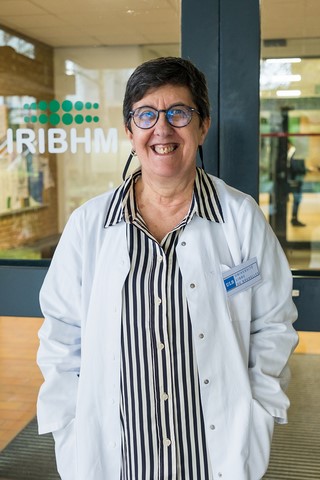Laureate 2023
The Generet Award for Rare Diseases has been awarded to Prof. Sabine Costagliola, FNRS’ Research Director and Director of the IRIBHM (Université Libre de Bruxelles), for her research using human organoid technology to model rare thyroid diseases. The Award, granted for the 6th consecutive year by the Generet Fund, managed by the King Baudouin Foundation, comes with prize money of one million euros, making it the most prestigious distinction for research into rare diseases in Belgium. The jury of independent experts paid tribute to the ambition of Professor Costagliola to improve, through her research, diagnosis of these pathologies, as well as the quality of life of patients who suffer from them.
The thyroid gland plays an essential role in the development and correct functioning of our metabolism. Situated at the base of the neck, the gland produces hormones that influence almost all of our tissues and organs, including brain development, cardiovascular functions, the regulation of basal metabolism, thermoregulation and regulation of the menstrual cycle.
Among the rare thyroid pathologies is congenital hypothyroidism, a condition that affects around 1 in 3,000 children and is characterised by a disfunction or absence of the thyroid gland at birth. Because of the central role played by thyroid hormones in early brain development, a non-detected and non-treated hypothyroid condition will lead to mental and growth retardation. Early detection and immediate treatment are thus essential, as is collaboration of the parents in ensuring regular and appropriate treatment, which are indispensable to securing the child’s normal cognitive development. In high-income countries such as Belgium, early screening is organised from a child’s birth, so enabling the rapid treatment of children with a thyroid problem. This is not the case in middle- and low-income countries where this type of screening is not systematic. Vigilance is therefore essential for children from disadvantaged regions, in whom there may be a non-detected thyroid problem.
A mostly unknown cause
Professor Sabine Costagliola has been studying the mechanisms underlying thyroid development and thyroid pathologies for many years at the Institut de Recherche Interdisciplinaire en Biologie Humaine et Moléculaire (IRIBHM) at the Université Libre de Bruxelles. Prof. Costagliola explains: “Despite identification of many of the genes involved in normal development of the thyroid, the molecular mechanisms underlying thyroid problems are still poorly understood. Today, we can explain around 10% of the cases of congenital hypothyroid, but this means that the great majority remain unexplained. The aim of my research is to understand why a child is born without a thyroid or has a poorly functioning thyroid.”
Professor Castagliola’s laboratory has also been at the forefront of creating thyroid organoids, which are mini-thyroids that are cultivated in vitro from pluripotent stem cells taken from mice and humans. “These organoids have shown their capacity to reproduce the developmental stages of the thyroid gland in vitro, and after being transplanted into mice without a thyroid gland, they have produced thyroid hormones in vivo. We are therefore going to be able to use this model to study pathologic situations and test out various hypotheses, using cells that have come directly from patients with a thyroid problem.”
Two rare thyroid pathologies
The financial support of the Generet Award will enable Sabine Costagliola and her team to continue their research aimed at using human organoids to model two rare thyroid pathologies.
The first pathology concerns congenital hypothyroidism. “We will study the molecular mechanisms underlying this pathology by using pluripotent cells from patients who have congenital hypothyroidism and discordant monozygotic twins for this pathology. In particular, we will analyse material taken from twins who share an identical genetic heritage, but where one has a normal and functional thyroid whilst the other has a dysfunctional atrophic thyroid. By using thyroid organoids derived from the cells of both patients we can compare in vitro a situation observed in vivo, and try to identify the molecular mechanisms responsible for the absence of normal thyroid development in one of the twins.”
The second pathology studied concerns the syndrome of resistance to TSH (Thyroid Stimulating Hormones), which is characterized by impaired sensitivity of the thyroid to TSH, stimulating the synthesis of thyroid hormones. Mutations in the THS receptor are often the cause of this syndrome, but an identical phenotype is also observed in the absence of receptor mutations. “In collaboration with the Genetics Department at the Université Libre de Bruxelles and the University of Chicago, the IRIBHM has identified a genetic variant linked to this syndrome. By using organoids carrying this variant, we will try to understand the molecular mechanisms that govern thyroid sensitivity to TSH. "
A diagnostic and therapeutic ambition
Professor Costagliola’s ambition goes beyond just basic research: “The Generet Award gives me the liberty to explore all hypotheses, thus opening the way to discovering new diagnostic tools and, in the longer term, to find new therapeutic solutions.”
Whilst living without a thyroid or with a dysfunctional thyroid is possible, this nevertheless means taking synthetic hormones for life. As Professor Costagliola explains, “Treatment with synthetic hormones can never totally replace a normal thyroid. Moreover, hormone needs change throughout our life and this requires constant fine adjustments. For some patients we never manage to find the optimal doses and this affects their everyday quality of life. We cannot be satisfied with patients being more or less alright, we must go further. If one day, we manage to succeed in transplanting a functional thyroid in patients, this will enable them to lead an incredibly more comfortable life.”
Laboratory of Prof. Costagliola
Press release of the King Baudouin Foundation
